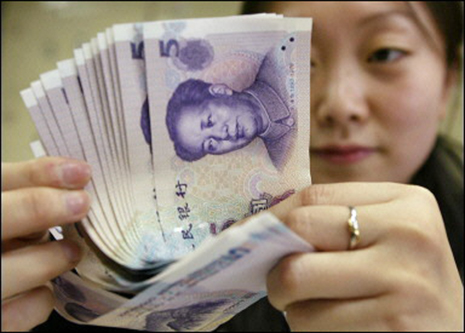China Currency Falls for 2nd Day After Surprise Devaluation

On Wednesday, the yuan dropped another 1.6 percent. In theory, it could drop 2 percent every day given it can trade 2 percent around a rate that is set based on the previous day`s closing value.
Until now, China has set the yuan`s value each day based on a basket of currencies that is believed to be dominated by the U.S. dollar. That meant the yuan rose as the dollar jumped over the past year, hurting its exporters and raising the threat of politically dangerous job losses. Exports in July plummeted by an unexpectedly steep 8.3 percent from a year earlier.
The People`s Bank of China promised Tuesday to keep the exchange rate "basically stable," but Wednesday`s decline prompted suggestions the yuan is likely to fall further.
The yuan is likely to see "continued strong influence" from the central bank, with Tuesday`s change "probably marking the start of an engineered depreciation," said Mizuho Bank in a report.
Many economists cautioned against seeing Beijing`s move mainly as an effort to benefit its exporters. They note that China`s currency, left to market forces alone, would have declined in value in recent months.
The depreciation "will not change the gloomy picture of global demand," said Vincent Chan of Credit Suisse in a report. "The 2 percent devaluation cannot provide any meaningful help, but it caught the market by surprise."
U.S. stocks tumbled Tuesday, with the Dow Jones industrial average closing down 212 points.
China becomes the third major trader to take actions that lower the value of its currency. Initiatives by Japan and the European Union over the past two years depressed the yen and euro by a wider margin than this week`s decline in the yuan.
The yuan, also known as the renminbi, is allowed to fluctuate in a band 2 percent above or below a rate set by the People`s Bank of China based on its currency basket.
The bank said that starting Tuesday, the daily target will be based on the yuan`s closing the previous day and information from traders about supply and demand for the currency.
The change presented a dilemma for China`s trading partners, who have called repeatedly for Beijing to let market forces set its exchange rate but don`t want to see the yuan weaken.
It sparked complaints in Washington, where members of Congress have long complained Beijing manipulates its currency to gain a trade advantage.
"For years, China has rigged the rules and played games with its currency," said U.S. Sen. Chuck Schumer. "Rather than changing their ways, the Chinese government seems to be doubling down."
The U.S. Treasury Department`s response was more measured.
"China has indicated that the changes announced today are another step in its move to a more market-determined exchange rate," a department statement said.















































